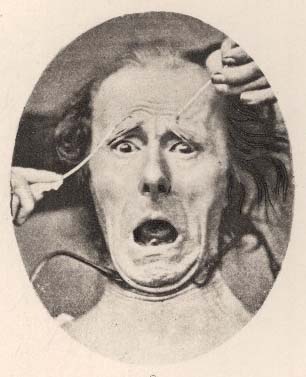Lack of sleep impairs emotion recognition
This is a re-post of an entry I had written exactly 4 years ago. I liked it so much I decided to share it again. The ability to read emotions is an important part of the human experience; the only way to successfully navigate through complex social environments. It comes in handy especially if you don the title of psychotherapist or professional poker player. Without it, you are rendered socially inept. You enter the world of the autistic individual.
Thanks to Charles Darwin we now know that it’s not just the eyes that are “the windows to the soul”. He first wrote about the subject of facial expressions in his 1898 book titled The Expression of the Emotions in Man and Animals (the link includes the work in its entirety). In it he described the emotions conveyed in the face as being both universal and “species-specific”.
Ekman and Friesen (1969) expounded on Darwin's theory, hypothesizing that universal facial expressions were to be found in the relationship between distinctive patterns of the facial muscles and particular emotions. In 1971 they traveled to Papua New Guinea to test the Fore tribe, a people who had minimal contact with outsiders. The researchers found that the Fore were able to accurately identify the expressions of emotion in photographs of people from cultures with which they were not yet familiar (here's a link to a fascinating NPR Ekman podcast).
An interesting, yet off-topic note: Apparently a Fore subgroup found in southern New Guinea regularly practiced cannibalism by dismembering and eating victims of the prion disease kuru (aka laughing sickness due to the outbursts of laughter during the second phase). Shirley Lindenbaum, a kuru researcher, reported that kuru victims were highly valued as a source of food because the layers of fat resembled pork...yum (Lindenbaum, 1979). Women would often feed brain and various parts of organs to their young and the elderly. Unfortunately, this was yet another mode of kuru transmission. The southern Fore knew better than to eat diseased corpses, but thought that kuru was more a mental affliction than a physical one.
van der Helm and colleagues over at the University of California decided to take a unique look at emotional recognition in the context of sleep. In their recently published SLEEP paper, they asked whether emotional processing would become significantly impaired in sleep deprived individuals.
The authors randomly assigned 37 young adults to either a sleep control or total sleep deprivation group. All participants abstained from caffeine and alcohol three days prior to and three days during the study (sucks to be them). Both groups were asked to perform an emotional facial recognition task at 16:00 for two consecutive days.
The task involved evaluating sad, angry, and happy faces from the Ekman Pictures of facial affect set. The participants were presented with 10 emotionally morphed pictures of the same person and asked to determine which emotion each facial expression was conveying. The control group got to sleep at home like normal people while the not so fortunate sleep-deprivees were kept awake in the sleep lab (at least they had internet!).
The team found that a single night of sleep deprivation significantly disrupted the ability to identify emotionally salient facial expressions in others. Deficits were most dramatic for emotions eliciting high autonomic arousal (i.e. happy and angry). Interestingly enough, they found that women in particular were more significantly influenced by sleep deprivation on emotion recognition (I suppose evolutionarily it seems to make sense).
They suggest that sleep loss impairs discrete affective neural systems involving the amygdala (fear center of the brain), basal ganglia (lesions here impair anger recognition), the orbitofrontal cortex, and anterior cingulate cortex (activation here is correlated with happy emotions).
Some study limitations the authors humbly listed include not measuring chronotype (alertness and preference for activity early or late in the day) and motivation/interest level, and not verifying compliance of sleep time and duration (such as using actigraph measurements).
So for all the sleep deprived psychotherapists and the poker players who decide to spend all night at the table, I hope this entry helps you to reconsider such unwise habits. In the words of the um...brilliant Lady GaGa:
Mum mum mum mah
Mum mum mum mah
Can't read my,
Can't read my
No he can't read my poker face
van der Helm E; Gujar N; Walker MP (2010). Sleep Deprivation Impairs the Accurate Recognition of Human Emotions SLEEP, 33 (3), 335-342
Ekman P, & Friesen WV (1971). Constants across cultures in the face and emotion. Journal of personality and social psychology, 17 (2), 124-9 PMID: 5542557
Steadman, L. (1980). : Kuru Sorcery: Disease and Danger in the New Guinea Highlands . Shirley Lindenbaum. American Anthropologist, 82 (3), 692-694 DOI: 10.1525/aa.1980.82.3.02a01130
Thanks to Charles Darwin we now know that it’s not just the eyes that are “the windows to the soul”. He first wrote about the subject of facial expressions in his 1898 book titled The Expression of the Emotions in Man and Animals (the link includes the work in its entirety). In it he described the emotions conveyed in the face as being both universal and “species-specific”.
Ekman and Friesen (1969) expounded on Darwin's theory, hypothesizing that universal facial expressions were to be found in the relationship between distinctive patterns of the facial muscles and particular emotions. In 1971 they traveled to Papua New Guinea to test the Fore tribe, a people who had minimal contact with outsiders. The researchers found that the Fore were able to accurately identify the expressions of emotion in photographs of people from cultures with which they were not yet familiar (here's a link to a fascinating NPR Ekman podcast).
An interesting, yet off-topic note: Apparently a Fore subgroup found in southern New Guinea regularly practiced cannibalism by dismembering and eating victims of the prion disease kuru (aka laughing sickness due to the outbursts of laughter during the second phase). Shirley Lindenbaum, a kuru researcher, reported that kuru victims were highly valued as a source of food because the layers of fat resembled pork...yum (Lindenbaum, 1979). Women would often feed brain and various parts of organs to their young and the elderly. Unfortunately, this was yet another mode of kuru transmission. The southern Fore knew better than to eat diseased corpses, but thought that kuru was more a mental affliction than a physical one.
van der Helm and colleagues over at the University of California decided to take a unique look at emotional recognition in the context of sleep. In their recently published SLEEP paper, they asked whether emotional processing would become significantly impaired in sleep deprived individuals.
The authors randomly assigned 37 young adults to either a sleep control or total sleep deprivation group. All participants abstained from caffeine and alcohol three days prior to and three days during the study (sucks to be them). Both groups were asked to perform an emotional facial recognition task at 16:00 for two consecutive days.
The task involved evaluating sad, angry, and happy faces from the Ekman Pictures of facial affect set. The participants were presented with 10 emotionally morphed pictures of the same person and asked to determine which emotion each facial expression was conveying. The control group got to sleep at home like normal people while the not so fortunate sleep-deprivees were kept awake in the sleep lab (at least they had internet!).
(similar morphing method used in the study)
The team found that a single night of sleep deprivation significantly disrupted the ability to identify emotionally salient facial expressions in others. Deficits were most dramatic for emotions eliciting high autonomic arousal (i.e. happy and angry). Interestingly enough, they found that women in particular were more significantly influenced by sleep deprivation on emotion recognition (I suppose evolutionarily it seems to make sense).
They suggest that sleep loss impairs discrete affective neural systems involving the amygdala (fear center of the brain), basal ganglia (lesions here impair anger recognition), the orbitofrontal cortex, and anterior cingulate cortex (activation here is correlated with happy emotions).
(Added the orbitofrontal and anterior cingulate cortex (ACC))
Some study limitations the authors humbly listed include not measuring chronotype (alertness and preference for activity early or late in the day) and motivation/interest level, and not verifying compliance of sleep time and duration (such as using actigraph measurements).
So for all the sleep deprived psychotherapists and the poker players who decide to spend all night at the table, I hope this entry helps you to reconsider such unwise habits. In the words of the um...brilliant Lady GaGa:
Mum mum mum mah
Mum mum mum mah
Can't read my,
Can't read my
No he can't read my poker face
(I wonder why?)
Ekman P, & Friesen WV (1971). Constants across cultures in the face and emotion. Journal of personality and social psychology, 17 (2), 124-9 PMID: 5542557
Steadman, L. (1980). : Kuru Sorcery: Disease and Danger in the New Guinea Highlands . Shirley Lindenbaum. American Anthropologist, 82 (3), 692-694 DOI: 10.1525/aa.1980.82.3.02a01130





